Was the first American Pope ushered in on a wave of suspect, last-minute betting? Something odd seems to have been happening on at least one online gambling platform – Polymarket – in the minutes before the new Pope was announced. I know because I happened to place a bet just before Pope Leo XIV walked out on the balcony of St. Peter’s – and watched the odds dramatically shortening before my eyes.
Before his election as Pope, Leo was Cardinal Robert Prevost. I’d barely heard the name until a week ago, when I joined a tour of the Vatican laid on by the Holy See press office. We were not, disappointingly, to be shown the Sistine Chapel, the world’s most splendid polling station for the few days of a papal election. A temporary wooden floor was being put in, our guide told us, and some of us speculated that this was to conceal the electronic jamming equipment the Vatican was installing in the chapel. The Church authorities wanted to make sure that if anyone did manage to smuggle a mobile phone into the conclave, it would be useless. The vote would take place in absolute secrecy.
Instead of the Sistine Chapel, we got a tour of the Vatican Museum’s rooms just behind it. These were once the Papal apartments and were traditionally put to use to accommodate cardinals attending a conclave. The apartments were opulent, covered in stunning frescos by masters such as Raphael, but they were not intended to accommodate a hundred guests or more. During papal elections, the cardinals slept cheek by jowl, and they snored. No one got any sleep. A popular reform of the brief 33-day papacy of John Paul I, in 1978, was to end this arrangement and give the cardinals proper accommodation during conclave. Tempers much improved during the voting.
Among the journalists listening to these stories, and admiring the splendor of the former papal apartments, was Austen Ivereigh. He is a contributor to The Tablet, who wrote a brilliant biography of Pope Francis: The Great Reformer, and another book with Francis: Let Us Dream. He was also one of the very few journalists to predict that Cardinal Bergoglio, as he once was, would be elected to the papacy in 2013. Naturally, I asked him for his prediction this time around.
I wasn’t necessarily expecting an obvious name: Parolin, the Vatican Secretary of State who was deputy to Francis; or Tagle, the cardinal from the Philippines who had some of Francis’s charm. But I thought that this might be the time, once again, for an Italian pope and mentioned cardinals Pizzaballa of Jerusalem – famous for offering himself in exchange for Israeli hostages – and Zuppi of Bologna, known as “the street priest,” for his love of the poor. Maybe, said Ivereigh, those were good names, but he had another: Prevost of Chicago.
Seeing my expression, Ivereigh set out his reasoning. A Pope had to be three things: a governor, a diplomat, and an evangelizer. The pope sits atop the Curia, the many layered Vatican bureaucracy, and must be an effective governor; the Roman Catholic Church spans most of the globe, and deals with most of the world’s governments, so the pope must be a skilled diplomat; and most importantly the pope must be able to reach out and connect to people… saving souls is after all the business of the Church.
Ivereigh ran through Prevost’s now familiar biography, and it seemed to tick all the boxes. He was running a big Vatican department, the Dicastery for Bishops, which had also helped him get to know many of the cardinal electors; he had spent most of his career outside the United States and spoke several languages fluently – English, Spanish, Italian, French, Portuguese, Latin – and would be at home on the international stage; finally, while it was true that he did not have the charisma of Francis, people seemed to like him, and Francis himself had not been seen as especially charismatic before he became pontiff.
The more I looked into the frontrunners, the more they seemed to have problems: Parolin was too much a grey man – he gave a poor sermon in last Sunday’s Papal beauty contest – and might have health problems; there were questions about Tagle’s skills as an administrator – Francis relieved him of his position running the Catholic charity Caritas – and about his judgement: some of the faithful didn’t like it when a video surfaced of him singing Imagine by the noted atheist John Lennon. (“Imagine there’s no heaven…no hell below us…and no religion too.”) And an Italian pope would seem too much like a return to business as usual. Meanwhile, Prevost’s name was starting to get mentioned by those who know the Church: in the Italian press; on the Catholic insiders’ Substack The Pillar; and by the Spectator’s own Damian Thompson. I thought that Prevost was plausible as a surprise, come-from-behind winner. To make things interesting, I thought I’d place a bet.
I can’t remember the last time I made a bet – years ago at a race course and I lost the small amount I wagered. Looking around for how to do this now, I decided on Polymarket, which describes itself not as a betting shop but as “the world’s largest prediction market.” It has been in the news for its uncanny skill in predicting elections – it got the US presidential election right when most polls said Donald Trump would lose. This is supposedly something to do with the wisdom of crowds, as measured by the flow of money into bets. At lunch, at a restaurant just around the corner from the Vatican, I looked at Polymarket’s odds on the next Pope. The betting crowd did not agree with my hunch that Prevost would win. He was way down the field, 12th or 13th, given a less than 1 percent chance of becoming the Bishop of Rome. Parolin was the clear favorite, with Tagle a respectable second.
Still, why not? I decided to put down a modest $20. I tried to place the bet but Apple wouldn’t let me pay on my phone so I waited until I got home. By the time I got my laptop out, the white smoke was already billowing out of the chimney atop the Sistine Chapel. I transferred 30 euros to fund my brand-new Polymarket account. The website would convert that into dollars, so I entered $20 in the box next to Prevost’s name. If he became Pope, Polymarket told me I would get some $6,776. Or more likely, I’d just be $20 poorer. I pressed the button. Nothing happened. Polymarket said it would be (a very precise) 12 minutes before my funds were available to bet with. I waited.
Twelve minutes later, at 18.57, the money still hadn’t landed. And something was happening in the little box where I would place the bet. The $6,776 changed, in the blink of an eye, to $5,911.13. A few seconds later, it was $4,704.22 I kept refreshing the page to see if my funds had arrived; the odds on Prevost kept shortening: my $20 would get me $3,900, $2,800, $2,100, then $1,700. I’ve missed the boat, I thought: they’ve announced it, or are about to. But CNN was still showing an empty balcony in St Peter’s. The Vatican band in their blue uniforms were still taking up their places in the great square; people wept and cheered, but there was no sign of a new pope.
The little counter at the top of the page told me the money had finally arrived and I made my bet. The $20 would now get me some $2,900, the figures bouncing around. Despite the ups and downs, the odds were still dramatically shorter than a few minutes earlier and it seemed as if money was piling into Prevost. Was this smart money? I had $8.85 left in my account after fees were taken from the 30 Euros. I put another $8 down. There was no time to transfer any more funds. A couple of minutes later, a new pope stepped onto the balcony of St Peter’s. It was Prevost. Polymarket informed me I had won $3,891.99 from a stake of $27.51, a gain of 13,977.46%.
What had happened? The one-hour graph from Polymarket’s page Who will be the next Pope shows Prevost’s odds going from 1% to 100% in the seconds before he stepped out onto the balcony. Was this just the market catching up with public information? Or did someone have a telescope or a drone to look into the room behind the balcony, and did that information move the market? More importantly perhaps, most of two thirds drop in odds I saw, while waiting for my account to receive the fund’s I’d sent, was some minutes earlier. That happened at around 7pm, and in the invisible space between 0 percent and 1 percent on the graph below, too small to see, but big enough for fortunes to be made.
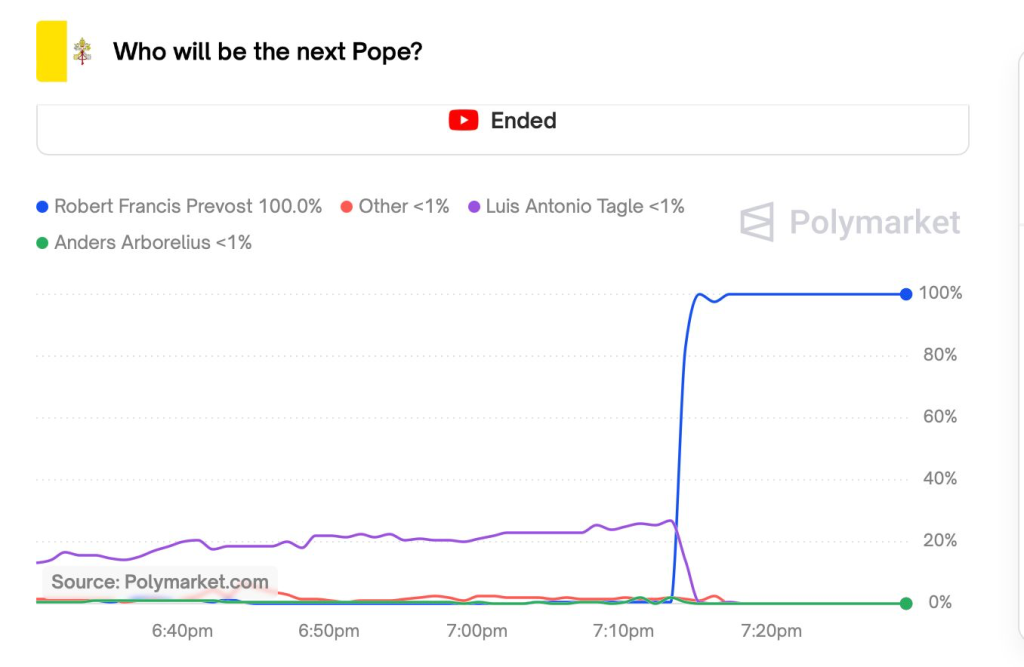
As we discussed on the Vatican tour, no call could have been made from inside the conclave. Could the cardinals’ decision have leaked – innocently as they left? What of the support staff? They are mostly nuns, the Swiss Guard and the Vatican Gendarmerie. Once out of the conclave, the circle widens. Is it possible, that someone saw Prevost donning the papal white in the minutes after his election, walking down a hallway – and decided to make a call? Do the shortening odds show that large bets were placed on Prevost in the time between the doors to the conclave being thrown open, and Leo appearing on the balcony. Or is this simply a coincidence? The Vatican may owe us an explanation – I certainly owe Austin Ivereigh a drink.



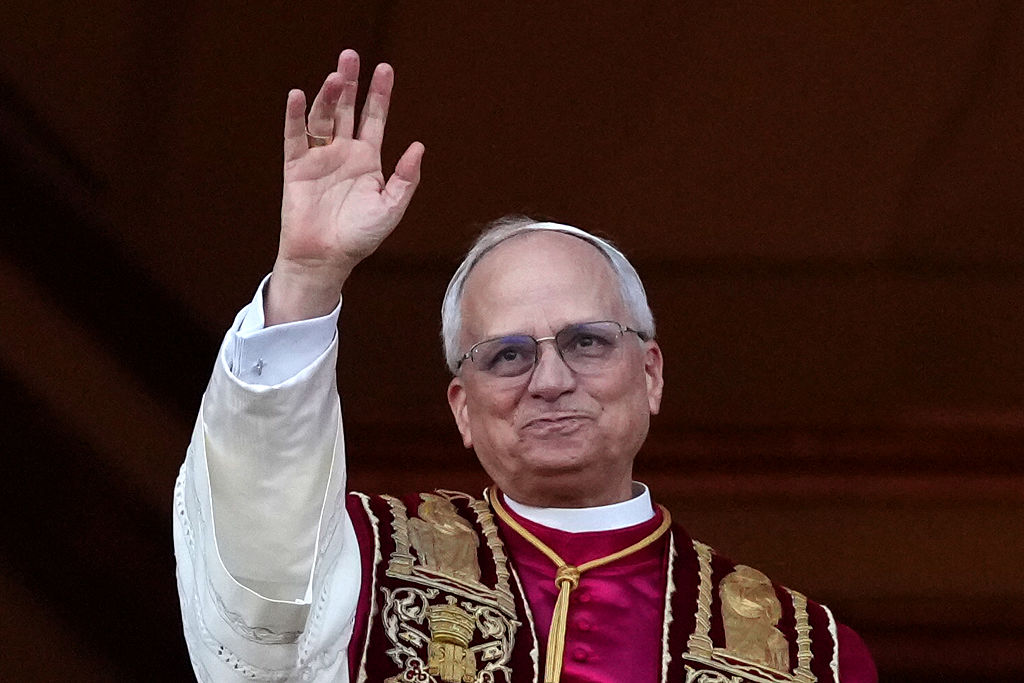






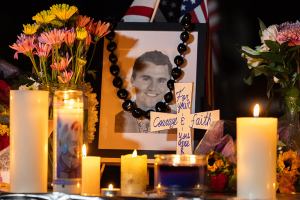
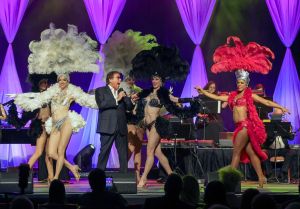
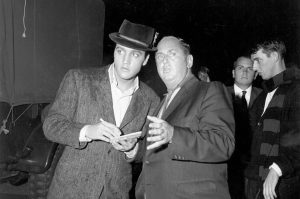
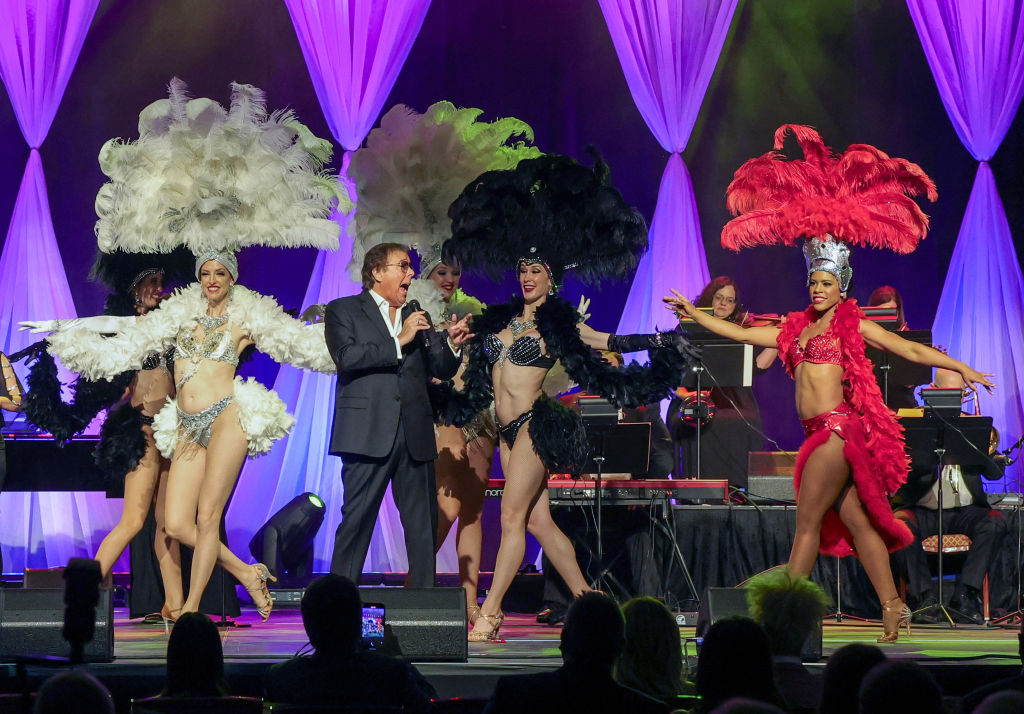
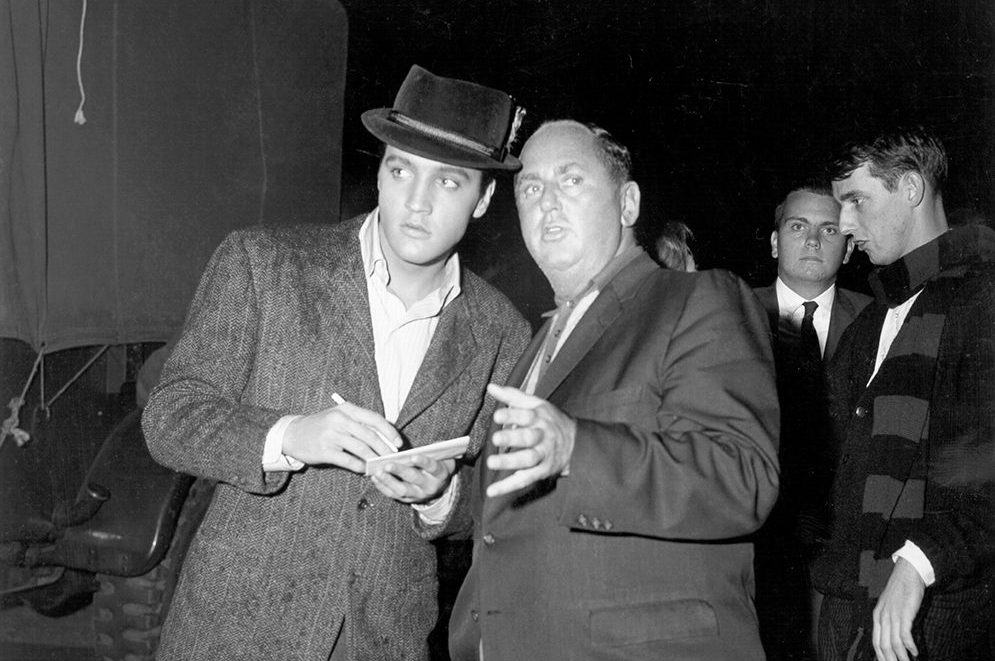
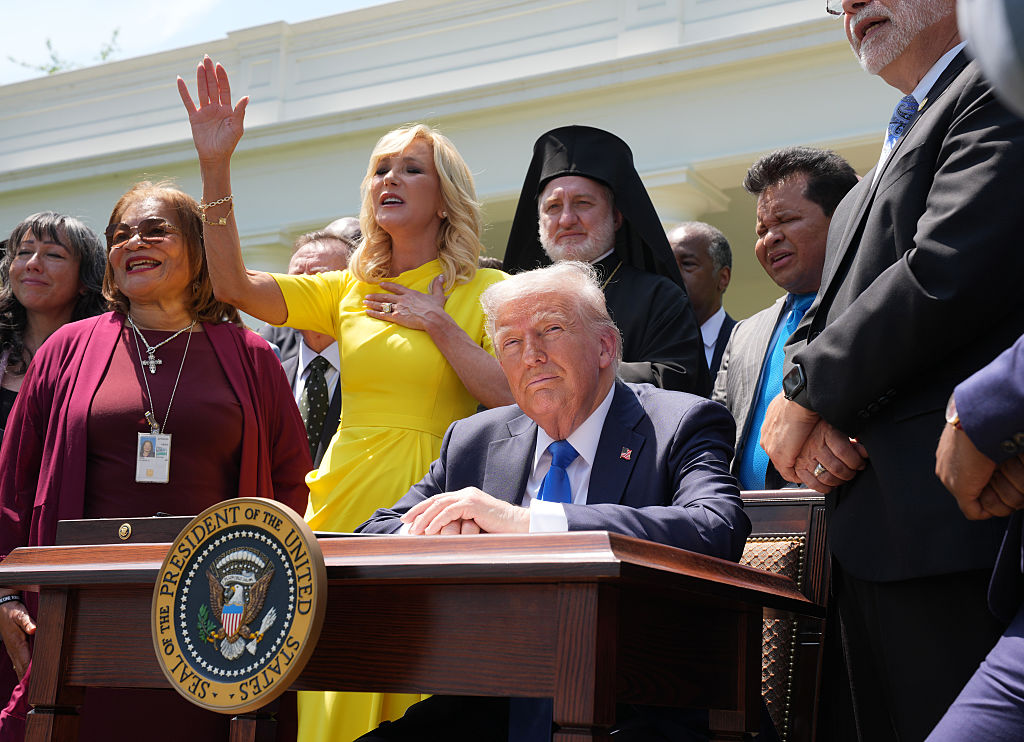
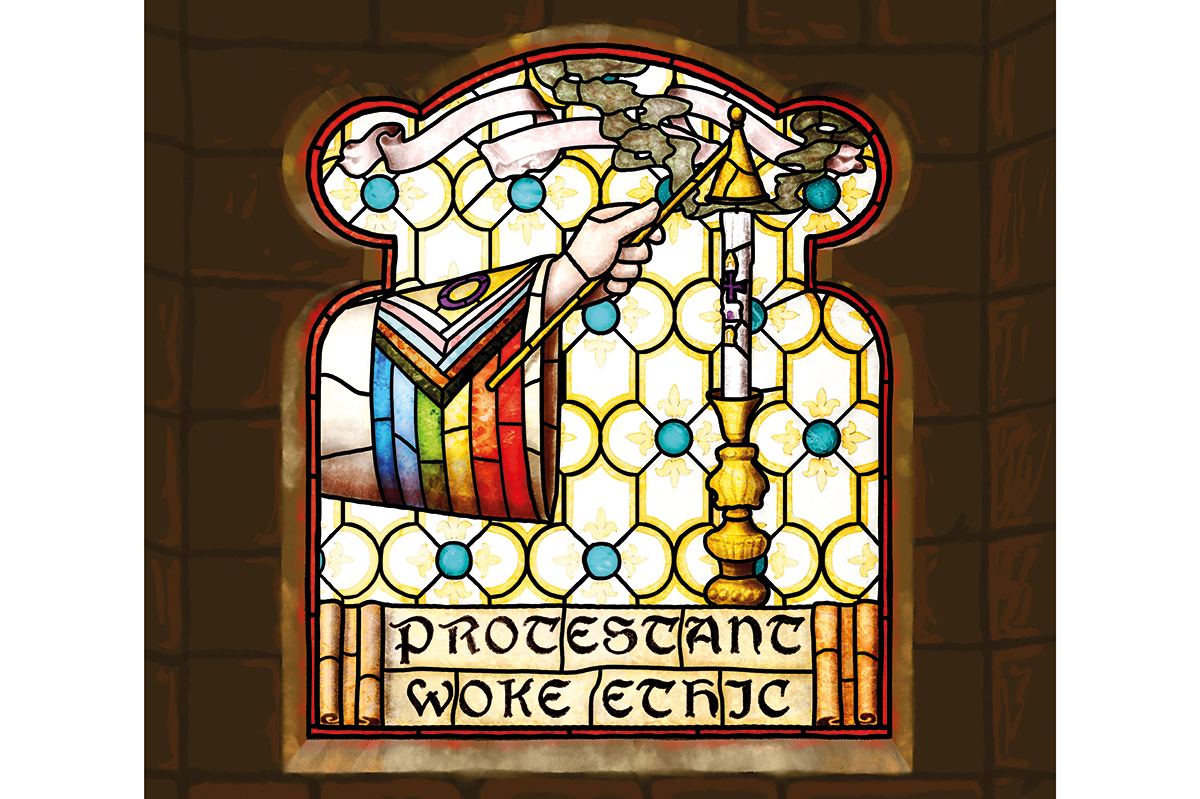

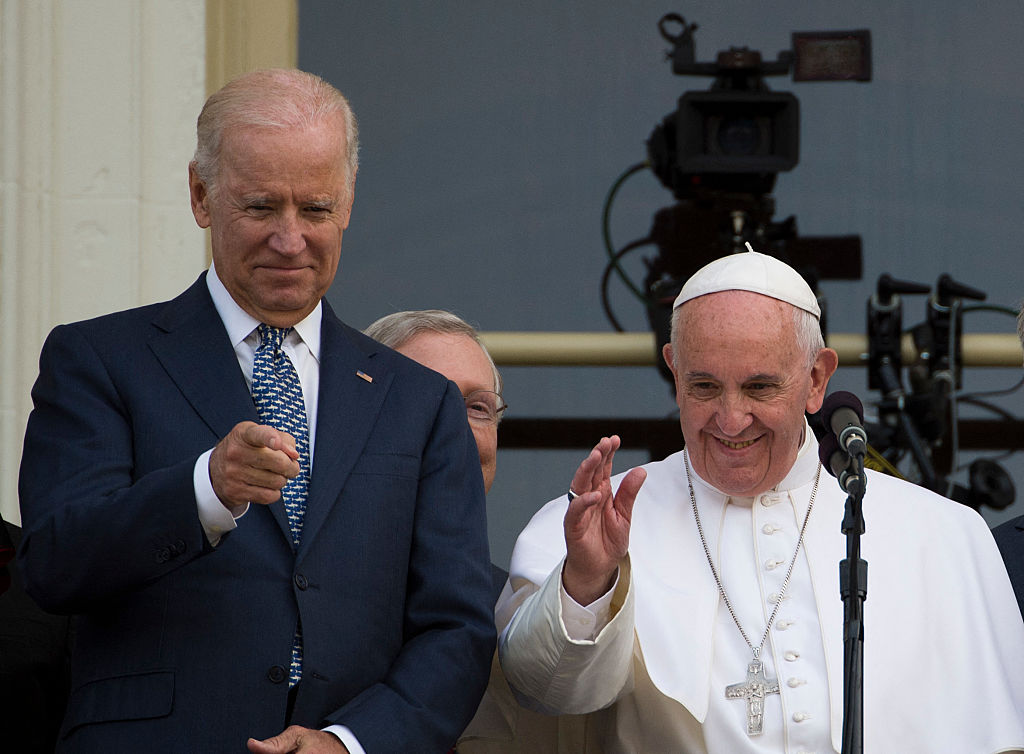







Leave a Reply